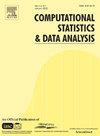Extremal local linear quantile regression for nonlinear dependent processes
IF 1.6
3区 数学
Q3 COMPUTER SCIENCE, INTERDISCIPLINARY APPLICATIONS
引用次数: 0
Abstract
Estimating extreme conditional quantiles accurately in the presence of data sparsity in the tails is a challenging and important problem. While there is existing literature on quantile analysis, limited work has been done on capturing nonlinear relationships in dependent data structures for extreme quantile estimation. They propose a novel estimation procedure that combines the local linear quantile regression method and extreme value theory. They develop a new enhanced Hill estimator for the conditional extreme value index, constructed based on the local linear quantile estimators at a sequence of quantile levels. That approach allows for data-adaptive weights assigned to different quantiles, providing flexibility and potential for enhancing estimation efficiency. Furthermore, they propose an estimator for extreme conditional quantiles by extrapolating from the intermediate quantiles. Their methodology enables both point and interval estimation of extreme conditional quantiles for processes with an α-mixing dependence structure. They derive the Bahadur representation of the intermediate quantile estimators within the local linear extreme-quantile framework and establish the asymptotic properties of their proposed estimators. Simulation studies and real data analysis are conducted to demonstrate the effectiveness and performance of their methods.
非线性相关过程的极值局部线性分位数回归
在尾部存在数据稀疏的情况下,准确估计极端条件分位数是一个具有挑战性和重要的问题。虽然已有关于分位数分析的文献,但在捕获依赖数据结构中的非线性关系以进行极端分位数估计方面所做的工作有限。他们提出了一种结合局部线性分位数回归方法和极值理论的新估计方法。他们在分位数水平序列的局部线性分位数估计的基础上,开发了一种新的增强的条件极值指标Hill估计。该方法允许将数据自适应权重分配给不同的分位数,为提高估计效率提供灵活性和潜力。此外,他们提出了一个估计极端条件分位数从中间分位数外推。他们的方法能够对具有α-混合依赖结构的过程的极端条件分位数进行点和区间估计。他们在局部线性极值-分位数框架内推导了中间分位数估计量的Bahadur表示,并建立了所提估计量的渐近性质。通过仿真研究和实际数据分析,验证了所提方法的有效性和性能。
本文章由计算机程序翻译,如有差异,请以英文原文为准。
求助全文
约1分钟内获得全文
求助全文
来源期刊

Computational Statistics & Data Analysis
数学-计算机:跨学科应用
CiteScore
3.70
自引率
5.60%
发文量
167
审稿时长
60 days
期刊介绍:
Computational Statistics and Data Analysis (CSDA), an Official Publication of the network Computational and Methodological Statistics (CMStatistics) and of the International Association for Statistical Computing (IASC), is an international journal dedicated to the dissemination of methodological research and applications in the areas of computational statistics and data analysis. The journal consists of four refereed sections which are divided into the following subject areas:
I) Computational Statistics - Manuscripts dealing with: 1) the explicit impact of computers on statistical methodology (e.g., Bayesian computing, bioinformatics,computer graphics, computer intensive inferential methods, data exploration, data mining, expert systems, heuristics, knowledge based systems, machine learning, neural networks, numerical and optimization methods, parallel computing, statistical databases, statistical systems), and 2) the development, evaluation and validation of statistical software and algorithms. Software and algorithms can be submitted with manuscripts and will be stored together with the online article.
II) Statistical Methodology for Data Analysis - Manuscripts dealing with novel and original data analytical strategies and methodologies applied in biostatistics (design and analytic methods for clinical trials, epidemiological studies, statistical genetics, or genetic/environmental interactions), chemometrics, classification, data exploration, density estimation, design of experiments, environmetrics, education, image analysis, marketing, model free data exploration, pattern recognition, psychometrics, statistical physics, image processing, robust procedures.
[...]
III) Special Applications - [...]
IV) Annals of Statistical Data Science [...]
 求助内容:
求助内容: 应助结果提醒方式:
应助结果提醒方式:


